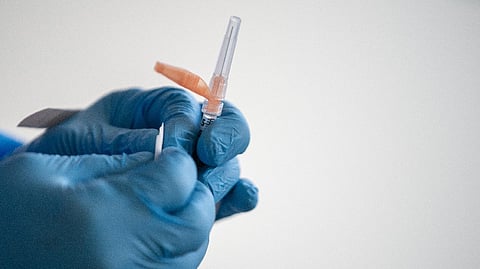

WASHINGTON: scientists have found a way to produce a protein in mice that can block multiple variants of the SARS-CoV-2 virus from entering cells and causing respiratory disease, an advance that may lead to a 'universal' treatment for COVID-19.
Using messenger RNA (mRNA) packaged in lipid nanoparticles, the scientists showed in a mouse model that host cells can produce a 'decoy' enzyme that binds to coronavirus spike proteins, meaning the virus should not be able to latch onto cells in the host's airway and start the infection.
"Rather than messenger RNA as a vaccine, this shows that mRNA can be used as a universal therapy against different coronaviruses," said lead researcher Gaurav Sahay from Oregon State University (OSU) in the US.
"Despite mass vaccination, there is an urgent need to develop effective treatment options to end this pandemic. Several therapies have shown some effectiveness, but the virus' high mutation rate complicates the development of drugs that treat all variants of concern," Sahay said.
Proteins are large, complex molecules that serve as the workhorses of cells, enabling all of the biological functions within a cell.
DNA holds the blueprints from which proteins get made after the code is first transcribed into mRNA.
An enzyme is a type of protein that acts as a catalyst for biochemical reactions. HACE2 short for human angiotensin-converting enzyme 2 is an enzyme of the airway cells.
It is also expressed in the heart, kidney and intestine, and plays a role in numerous physiological functions.
"Simply giving a COVID-19 patient hACE2 would have limited effectiveness in treating the disease because the soluble form of the enzyme, the kind that can circulate throughout the body, has a short half-life less than two hours, meaning it would not stay in a person's system very long," Sahay said.
However, lipid nanoparticles (LNP) containing mRNA that orders production of the enzyme can help overcome that problem.
In the study, published in ACS Nano and Advanced Science, the researchers engineered synthetic mRNA to encode a soluble form of the enzyme, packaged the mRNA into lipid nanoparticles and delivered it to cells in the liver with an IV.
Within two hours, the enzyme was in the mice's bloodstream, and it stayed there for days. The scientists also delivered the loaded LNP via inhalation, prompting epithelial cells in the lungs to secrete soluble hACE2.
"The soluble enzyme effectively inhibited live SARS-CoV-2 from infecting host cells," said OSU postdoctoral researcher Jeonghwan Kim.
"The synthesis of mRNA is fast, affordable and scalable, and LNP-delivered mRNA can be repeated as necessary to sustain protein production until the infection subsides. Once treatment stops, the no-longer-needed soluble hACE2 clears the system in a matter of days," Kim said.
Next steps involve showing that the protein prevents infection in mice, said Sahay, who added that the mRNA treatment is possibly "a couple of years" away from being available to human patients.
Visit news.dtnext.in to explore our interactive epaper!
Download the DT Next app for more exciting features!
Click here for iOS
Click here for Android